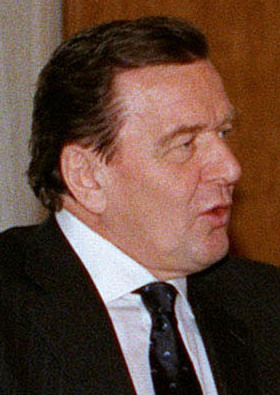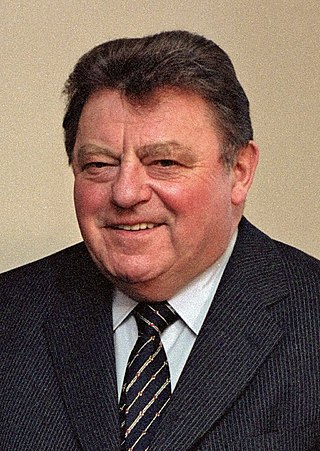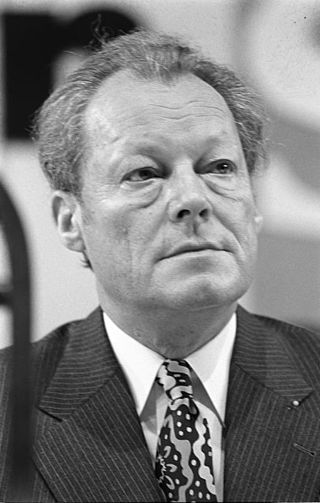
The Christian Social Union in Bavaria is a Christian democratic and conservative political party in Germany. Having a regionalist identity, the CSU operates only in Bavaria while its larger counterpart, the Christian Democratic Union (CDU), operates in the other fifteen states of Germany. It differs from the CDU by being somewhat more conservative in social matters, following Catholic social teaching. The CSU is considered the de facto successor of the Weimar-era Catholic Bavarian People's Party.

Germany is a democratic and federal parliamentary republic, where federal legislative power is vested in the Bundestag and the Bundesrat.

The Christian Democratic Union of Germany is a Christian democratic and conservative political party in Germany. It is the major catch-all party of the centre-right in German politics.

Federal elections were held in Germany on 22 September 2002 to elect the members of the 15th Bundestag. Incumbent Chancellor Gerhard Schröder's centre-left "red-green" governing coalition retained a narrow majority, and the Social Democratic Party (SPD) retained their status as the largest party in the Bundestag by three seats.

Federal elections were held in Germany on 27 September 1998 to elect the members of the 14th Bundestag. The Social Democratic Party (SPD) emerged as the largest faction in parliament for the first time since 1972, with its leader Gerhard Schröder becoming chancellor. The Christian Democrats had their worst election result since 1949.

Federal elections were held in Germany on 16 October 1994 to elect the members of the 13th Bundestag. The CDU/CSU alliance led by Helmut Kohl remained the largest faction in parliament, with Kohl remaining Chancellor in a narrowly re-elected coalition with the Free Democratic Party (FDP). This elected Bundestag was the largest in history until 2017, numbering 672 members.

Federal elections were held in Germany on 2 December 1990 to elect the members of the 12th Bundestag. This was the first all-German election since the Nazi show election in April 1938, the first multi-party all-German election since that of March 1933, which was held after the Nazi seizure of power and was subject to widespread suppression, and the first free and fair all-German election since November 1932. The result was a comprehensive victory for the governing coalition of the Christian Democratic Union/Christian Social Union and the Free Democratic Party (FDP), which was reelected to a third term. The second vote result of the CDU/CSU, 20,358,096 votes, remains the highest ever total vote count in a democratic German election.

Federal elections were held in West Germany on 6 March 1983 to elect the members of the 10th Bundestag. The CDU/CSU alliance led by Helmut Kohl remained the largest faction in parliament, with Kohl remaining Chancellor.

Federal elections were held in West Germany on 5 October 1980 to elect the members of the 9th Bundestag. Although the CDU/CSU remained the largest faction in parliament, Helmut Schmidt of the Social Democratic Party remained Chancellor.

Federal elections were held in West Germany on 3 October 1976 to elect the members of the 8th Bundestag. Although the CDU/CSU alliance became the largest faction in parliament, Helmut Schmidt of the Social Democratic Party remained Chancellor.

Federal elections were held in West Germany on 19 November 1972 to elect the members of the 7th Bundestag. In the first snap elections since the resumption of democratic elections in 1949, the Social Democratic Party became the largest party in parliament for the first time since 1930, winning 230 of the 496 seats. The coalition with the Free Democratic Party was resumed.

Federal elections were held in Germany on 18 September 2005 to elect the members of the 16th Bundestag. The snap election was called after the government's defeat in the North Rhine-Westphalia state election, which caused them to intentionally lose a motion of confidence to trigger an early federal election. The outgoing government was a coalition of the centre-left Social Democratic Party of Germany (SPD) and Alliance 90/The Greens, led by federal Chancellor Gerhard Schröder. The election was originally intended for the autumn of 2006.
CDU/CSU, unofficially the Union parties or the Union, is a centre-right Christian democratic political alliance of two political parties in Germany: the Christian Democratic Union of Germany (CDU) and the Christian Social Union in Bavaria (CSU).

An indirect presidential election was held in Germany on 23 May 2009. The president of Germany is elected by the Federal Convention, which is made up of the members of the Bundestag and an equal number of members elected by the state parliaments.

The history of Germany from 1990 to the present spans the period following the German reunification, when West Germany and East Germany were reunited after being divided during the Cold War. Germany after 1990 is referred to by historians as the Berlin Republic. This time period is also determined by the ongoing process of the "inner reunification" of the formerly divided country.
This is a list of opinion polling results for the 2013 German federal election, held on 22 September 2013.

Peter Hintze was a German politician of the Christian Democratic Union (CDU) who served as a member of the German Bundestag from 1990 until his death in 2016.

Federal elections were held in Germany on 26 September 2021 to elect the members of the 20th Bundestag. State elections in Berlin and Mecklenburg-Vorpommern were also held. Incumbent chancellor Angela Merkel, first elected in 2005, chose not to run again, marking the first time that an incumbent Chancellor of the Federal Republic of Germany did not seek re-election.
















